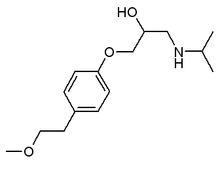Early studies with selective beta blockers, such as bisoprolol and metoprolol XL, and with nonselective beta blockers, such as carvedilol, have demonstrated survival benefit in patients with congestive heart failure. A more recent trial of bucindolol that did not show a survival benefit suggested that not all anti-adrenergic agents have the same effect. Another study, the Carvedilol or Metoprolol European Trial, currently is comparing mortality and morbidity benefits of carvedilol and metoprolol in patients with moderate and severe congestive heart failure. Until this study is complete, treatment decisions must be based on smaller comparison studies. Rajput and associates reviewed six small studies comparing the efficacies of carvedilol and metoprolol in patients with congestive heart failure and decreased left ventricular function.
In three studies, both drugs significantly improved patients' New York Heart Association class, although there was no significant difference in class improvement between the comparison groups. This functional improvement was associated with improved myocardial contractility. Two studies with longer follow-up periods showed a greater improvement in ejection fraction in patients who took carvedilol. In three of the six studies, patients who took carvedilol for more than six months had a greater increase in left ventricular ejection fraction and a decrease in left ventricular chamber size. Cardiac response to exercise improved more in patients receiving carvedilol therapy.
The authors conclude that although both agents improve cardiac remodeling in patients with congestive heart failure, carvedilol provides superior resolution of left ventricular fraction. Patients who do not respond to metoprolol may improve when switched to carvedilol.
Rajput FS, et al. Choosing metoprolol or carvedilol in heart failure (a Pre-COMET Commentary). Am J Cardiol July 15, 2003;92:218-21.
EDITOR'S NOTE: Carvedilol is a nonselective beta blocker that affects [b.sub.1]-, [b.sub.2]-, and [a.sub.1]-adrenoreceptors and has antioxidant and antiproliferative effects. The use of carvedilol in the treatment of patients with left ventricular dysfunction seems to reverse ventricular remodeling, decrease the risk of hospitalization, and lower mortality rates. Diastolic dysfunction also is improved in patients with symptomatic heart failure and abnormal diastolic function (patients with normal left ventricular function). Other positive effects of carvedilol therapy in patients with congestive heart failure include renal vasodilation, increased plasma vascular endothelial growth factor levels, and reduced tumor necrosis factor and interleukin levels. Efficacy appears to be similar in blacks and nonblacks, in patients with and without diabetes, and in patients who are not receiving concomitant spironolactone therapy.
Dosages should start at 3.125 mg twice daily, with slow titration over at least two weeks to the target dosage of 25 to 50 mg daily in two divided doses. Therapy seems to be well tolerated; large trials have not found a significant difference in the dropout rates of patients taking carvedilol compared with patients who received placebo. The most common adverse effects are dizziness, worsening of heart failure, symptomatic bradycardia, and hypotension. Contraindications include cardiogenic shock; decompensated heart failure requiring the use of intravenous inotropes; bronchospasm or asthma; second- or third-degree heart block; bradycardia; and significant hepatic dysfunction.--R.S.
COPYRIGHT 2004 American Academy of Family Physicians
COPYRIGHT 2004 Gale Group



